|

By Dave Ferguson
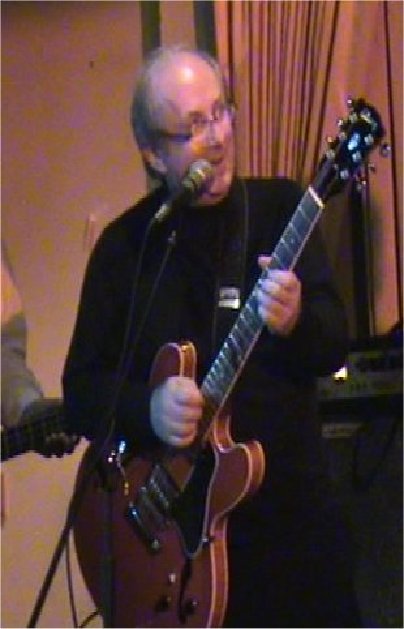 Around 1962 with the Liverpool
scene well under way everyone wanted to be in a band, I
was in my last year at Hillfoot Hey Grammar school in
Woolton. For the first time we had a school dance and a
band called the Renegades played some
amazing new heavy beat music. I remember
thinking I got get into this. I had taken up the guitar a
year earlier but couldn't play too well. Around 1962 with the Liverpool
scene well under way everyone wanted to be in a band, I
was in my last year at Hillfoot Hey Grammar school in
Woolton. For the first time we had a school dance and a
band called the Renegades played some
amazing new heavy beat music. I remember
thinking I got get into this. I had taken up the guitar a
year earlier but couldn't play too well.
The boys at the
dance were talking about some new band called the
Beatles; the guy at the centre of the
conversation was Tony Bramwell who was a
year ahead of me at school, but already a roadie to this
new weird but sensational band. Tony went on to become a
major player in the development of Apple. On the long
journey home to Broadway in Norris Green
(About an Hours ride on the No 81 Bus). I was born in the
year of the bulge 1947, which basically meant all the
returning soldiers from World
War2 hadn't had
a shag for years and got randy producing millions of
little brats like me, which in turn meant you were sent
to any school that could fit you in. In my case, the
bloody place was 20 miles from home. That's my
excuse for fluncking my GCEs) I had plenty of time to
think about the music. Gotta be in a band, I thought. My
best mate Mike Parker lived two doors
away and already had the gear; a Hofner Verithin and a
Vox AC15. Next door the other way lived John Hayton who
played drums in the 44th Boys Brigade.
And so the
Bumblies were born, well actually, the first
name we thought of was the SoundTracks, but Mike was a
big fan of the comedian Michael Bentine who performed his
TV show with some little space puppets called
Bumblies
and he so he suggested the name which had a
more "Beatlee" sort of ring. The first practice was
at a church hall on Queens Drive, I can't quite remember
the name of 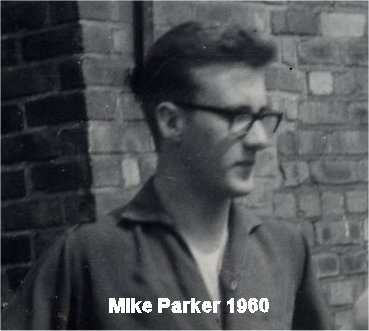 the church but it's at the junction of
Queens Drive and Muirhead Avenue. So there we were one
acoustic guitar, one Hofner Verithin a snare drum and the
biggest friggin Bass drum in the history of Rock music,
complete with the name of the band on the skin The
44th BB. John did'nt have a pedal so he just
booted the bass drum, unfortunately fashion at the time
dictated that we all wore "Winklepickers" so
after about 3 bars the toecap of his winkle appeared
through the skin in between the words Property of and 44th
BB!!. And that was the end of the practice, as we all
legged it before the Vicar found out. the church but it's at the junction of
Queens Drive and Muirhead Avenue. So there we were one
acoustic guitar, one Hofner Verithin a snare drum and the
biggest friggin Bass drum in the history of Rock music,
complete with the name of the band on the skin The
44th BB. John did'nt have a pedal so he just
booted the bass drum, unfortunately fashion at the time
dictated that we all wore "Winklepickers" so
after about 3 bars the toecap of his winkle appeared
through the skin in between the words Property of and 44th
BB!!. And that was the end of the practice, as we all
legged it before the Vicar found out.
And that was pretty
well the end of the Soundtracks, as John would'nt
commit to getting a drum set. Depressed, we thought that
was it, but somehow, we bumped into a very cool looking
dude called George Robinson. You'll
remember that great line in Sultans of Swing "You check
out guitar George he knows all the chords". Well check
out this Guitar George he had all the gear; the collar
less jacket, hair down to his knees and most importantly
a brand new Fender Precision bass. Could he play? Who
cared, he was in. Our first practice was at the
Clubmoor Conservative Hall which was at
the back of Broadway where Mike and I
lived.
The first few gigs
were not that great and my greatest memory of those dim
distant days was being covered in blood at the end of the
night. George was a glazier and his fingers were normally
cut to ribbons... so playing next to George was a
very hazardous business.
George was very
much into the Rolling Stones and I was a Beatlehead, and
I think that was the main reason for me moving
on.
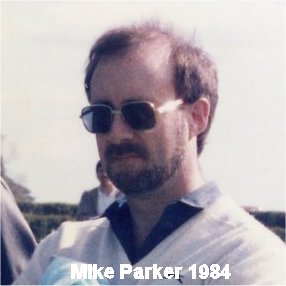 Mike continued on with the band and we
remained close friends until his untimely death in 2002. I
bought Mike's Gibson and his Stratocaster off the
estate and they have pride of place on my Guitar wall at
home. Mike continued on with the band and we
remained close friends until his untimely death in 2002. I
bought Mike's Gibson and his Stratocaster off the
estate and they have pride of place on my Guitar wall at
home.
I went on to play
with The Six Foot Four (That was a bit
of a problem as I'm 5ft 3in )), The
Politicians and The Countdowns,
but if I'm really honest, none of those bands ever
recaptured
the excitement of three wild
kids dreaming the dream....if only for a short
while.
As for me, I
finished playing in 1968 and my guitar followed me round
the world to Australia on to Spain and finally back to
where I once belonged, Liverpool. Two years ago the bug
returned and I now play with Merseycats every Thursday
and do a few Gigs for charities.
George retired a
couple of years ago, after performing for a number of
years with his lovely lady Kate as the Cryin
Shames Duo around Europe, but as I write we have
just decided to
do couple of revival
gigs for 2009, hopefully with the bands best Drummer
Charlie Gallagher...and well you never
know...Shay Stadium here we come.
What follows now
is George's story, From Bumblies to Cryin
Shames, written before he
retired.
I believe that in
the days when George and Jon Bennett fronted the band,
they were the best band ever to come out of
Liverpool...with perhaps just one
exception!!!
"Keep rockin in
the Free World"
Dave
Ferguson January 2009

I was born in
Norris Green, Liverpool on December 26 1943 and attended
Broad Square School and then on to Roscoe
Garfield.
As with most of the Liverpool
musicians, it was early rock 'n' roll artists who started my
interest in music, especially Buddy Holly and
Lonnie Donegan.
I remember studying the picture on
the cover of the 'Chirping Crickets' album:
the guitar that Holly was holding baffled me - I hadn't seen
one like it before; it seemed to be made of plastic.
My first guitar was a cheap
second-hand acoustic from Stanley's in Scotland Road. A
lot of early skifflers bought guitars at the same
place.
My brother-in-law Norman
Eastwood was in one of the first Liverpool groups,
playing tea-chest bass for the Black Cat Trio + One. They
played mostly cinemas and church halls during the late
1950s.
Another lad living near our house,
Sidney Nugent, played a few chords, and I learned a bit from
him, including the intro to Cliff Richard's 'Move
It.'
Tony Waddington also lived nearby
- about 1960 he did a great version of 'Be-Bop-A-Lula' on his
homemade guitar, and at that time he taught me the intro to
'Rock Around With Ollie Vee.' I still play it
his way to this day.
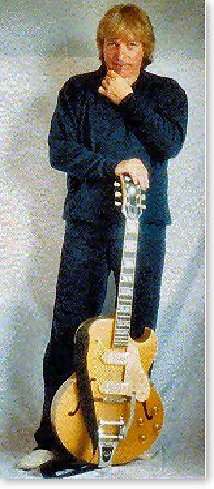 I joined the Casbah in 1959.
It was over the road from where I lived. Like many others,
I paid sixpence to go and see the skiffle group. I had no
idea until later that it was the Beatles. I joined the Casbah in 1959.
It was over the road from where I lived. Like many others,
I paid sixpence to go and see the skiffle group. I had no
idea until later that it was the Beatles.
My working life started in 1960 at
the Municipal Buildings, Dale Street. One of my workmates was
Don Andrew from the Remo Four. He was older than me and had to
teach me the job.
From him I found out what a Fender
guitar was, although nobody in Liverpool had one yet, to my
knowledge.
Everything in the office was
covered in pictures of Yogi Bear, the popular cartoon
character, wearing big black glasses and playing a red Fender.
Don was a good cartoonist.
My haunts as a teenager were the
Holy Rosary and the Orrell Park
Ballroom.
It was in 1960, after seeing the
Shadows perform, that I decided I wanted to be a bass player
(Jet Harris had a real Fender bass with a tortoise shell pick
guard).
I became a Shadows fanatic, and
still am. I bought every record of theirs.
My first bass was a
Fender like Jet Harris: it was purchased at
Cranes music shop. It cost £120 on HP; it was slightly more
expensive for a Sunburst colour.
The salesman was Joe
Butler, bass player with Sonny Webb & the
Cascades. All I had to do was learn to play
it!
The Beatles had
recently returned from Hamburg. That was a turning point
for me. I couldn't believe it when I first saw them. I
liked Cliff and the Shadows, but overnight I became
converted. The Beatles were marvellous - they looked and
sounded dangerous. It was a similar feeling that came
over me when I first saw Little Richard in the film
'The Girl Can't Help It.' At the time I
thought the Beatles were German - I remember a lot of
people thought the same.
I liked most of the Liverpool
groups around at the time: Cliff Roberts and the
Rockers and Denny Seyton & the
Sabres come to mind. I loved the Remo
Four.
I saw the Beatles
loads of times before they made it big. Cavern lunch times were
the best.
They still owe me for some toast I
paid for in the Jacaranda Club!
I was at the Cavern when George
Harrison got his eye blacked. The culprit was one of the Casbah
crowd, his name was 'Bruno', and he came from Norris Green.
Bruno was angry that Pete Best was being dropped. There was a
crowd from the Casbah there that night, and earlier, in the
Jolly Miller pub I had heard them saying that there would be
trouble.
I formed a group with Mike
Parker and Dave Ferguson from
Broadway.
The name we called
ourselves, the Bumblies, came from a TV
show starring Michael Bentine. It seemed a good choice at
the time. Surprisingly, our first gig was at
Broadway Conservative Club - Mike's dad
had some influence there. Paul McCartney claims his first
gig with the Quarry Men was there. We tried to play rock
'n' roll but weren't very good, however, I did learn a
lot.
For some vague reason we saw the
name the Bumblies as similar to
Beatles.
Nationally the Mersey sound was
the big thing.
I joined a group in the early
1960s: Buddy Dean & the Teachers. They
were very good and I learned a lot from them also. I don't
remember their names, only Richie the powerful drummer. The
Teachers didn't last long, unfortunately.
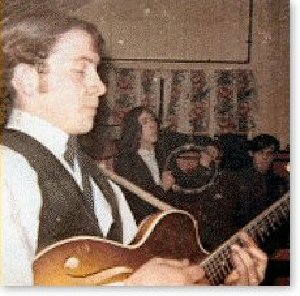 During 1963 I formed a group of my own.
John Bennet played guitar, he was a
friend of Gus, the guitarist with Karl
Terry. John had learned a lot from Gus. John was
a marvellous guitar player for the time. During 1963 I formed a group of my own.
John Bennet played guitar, he was a
friend of Gus, the guitarist with Karl
Terry. John had learned a lot from Gus. John was
a marvellous guitar player for the time.
Terry Hines, who lived not far
from me, formed the nucleus of the Clayton
Squares at the time.
The rhythm guitarist in our group
was a lad named Dougie, I'm sad to say I don't remember his
other name, but he had a Fender Stratocaster. The vocalist was
Joey Kneen. We used the name
Bumblies again. Various drummers came and
went, we were quite ambitious and maybe people who were more
easy going than we were found it hard to work with us. Finally,
we got Charlie Gallagher, a brilliant drummer
who was with the Calderstones. He brought the
very competent Phil Roberts along on
keyboards, so Dougie had to leave because we didn't need a
rhythm guitarist any more.
Sadly, Pete
Maxwell, the guitarist who had formed the
Calderstones, was killed in a motorcycle accident shortly
after.
We started making a
name for ourselves around Liverpool, gaining a residency
at the Rumblin' Tum in Hardman Street.
Neil English, the owner, was very 'hip' and into Blues
and Jazz. He helped us a great deal, allowing us to
practice at the club, and he brought great records for us
to learn from.
I saw Neal recently at the Albert
Dock; he has a clothes shop there.
Please Stay
1966
We were also
getting to be pretty good musicians. The year was 1964. The
line-up was George Robinson, bass; John Bennett,
guitar; Phil Roberts, keyboards; Charlie Gallagher, drums; Joey
Kneen, vocals.
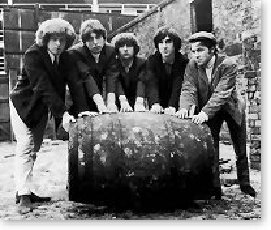 I believe we were one of the best on Merseyside
at that time, we had a huge following, despite the fact
that Bob Wooler kept us out of the
Cavern. I believe we were one of the best on Merseyside
at that time, we had a huge following, despite the fact
that Bob Wooler kept us out of the
Cavern.
Other groups at the time were
the Roadrunners, Kruzads,
Them Grimbles, Hideaways and
the Clayton Squares. Billy Kinsley was also
back on Merseyside with the
Kinsleys.
They were the competition and they
were all very good, although I think we all lacked the
experience of the earlier groups.
Chris Curtis, for
instance, amazed me with his comments regarding the
technicalities for the Crickets music. He understood
it.
Rory was still around at the time,
but I think he knew he had missed his chance. We all liked Rory
and got on really well. I still think about him.
The next major event for us was
Charlie Crane joining the band. Charlie had
been around for a while with various bands, when he joined us
we were complete. Joey was a good rocker, but Charlie could
sing ballads - together they were excellent.
Norman Eastwood
was managing the group at this time. He did well considering he
was only dabbling part time. He eventually quit work as a
printer at Liverpool Letterpress and became our road
manager.
We played at the Sink,
Iron Door, Orrell Park Ballroom, St Luke's, Heaven and Hell and
the Grave, all the popular venues, sometimes two a
night. The money was pathetic but I remember the times with
fondness.
I had heard about Joe
Meek and got his phone number from the London phone
book - it was as simple as that.
He was very pleasant on the phone
and we talked for a while. When I went to London I went alone,
called in, and did a demo (I played guitar and sang
'Bright Lights, Big City'). The others would
not come, I think it was Easter and they all had plans. Meek's
advice was "get a group and come back." I did. A few weeks
later I went with Joey, and the others followed on a few days
later. Meek was as good as his word, and we recorded a number
of songs.
Meek was ecstatic at our
arrangement of 'Please Stay' and agreed to record it. Decca
subsequently informed us that in their opinion the record would
be a big hit. This led to changes within the band. It was
decided by Meek that we should replace John Bennett with Richie
Routledge, the guitarist with Liverpool based Aztecs. Richie
was only sixteen, yet he fitted in well, and handled the
success like a veteran.
We had to work on presentation. It
was also decided that the name Bumblies was
dodgy, due to the fact that Michael Bentine had copyrighted the
name. After much thought, we became the Cryin'
Shames. We chose the name simply because it could be
abbreviated to 'Shames', like 'Stones', who we also
admired.
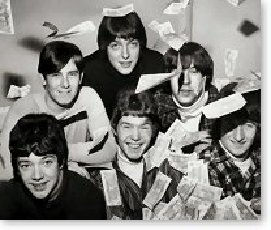 When 'Please Stay' was
released, it sailed into the charts. Brian
Epstein invited us to the Adelphi Hotel and made
us an offer of management, but due to disagreements
concerning Brian Harvey of Music Echo who had designs on
managing us, we turned this offer down. When 'Please Stay' was
released, it sailed into the charts. Brian
Epstein invited us to the Adelphi Hotel and made
us an offer of management, but due to disagreements
concerning Brian Harvey of Music Echo who had designs on
managing us, we turned this offer down.
Later that same week
Meek was at Nems offices with Eppy and
telephoned us. He desperately wanted to work with Nems, but
we were emphatic. Unfortunately, one of our members told
them both to 'F-off'. Meek broke down and cried in front of
the Nems staff. I know this was a fact and
he never forgave me because he thought I was the instigator
in the revolt. It was shortly after that he shot himself to
death. Refusing to sign with Nems was probably our biggest
mistake, and may possibly have contributed to Meek's
depression.
Not signing with Nems had
repercussions for us. The record suddenly stopped moving and TV
appearances were cancelled.
However, although our success only
lasted months, it was a wonderful time.
The Scaffold made
our clothes; they had a boutique (there's a Sixties word!) in
Dale Street. They also did our hair at the same premises. We
were actually featured on TV having our hair styled.
Lewis's department store had life
sized photographs of all six of us in the windows right around
the shop.
We were invited to parties with
the big names in the pop world. We mixed socially with
the Walker Brothers and we appeared in
theatres with our idols. Roy Orbison and
Martha & the Vandellas were just two of
them.
Nights out were at the
Scotch of St James, the nightclub where all
the stars went.
We did the Dick Clark
Show in the U.S.A. Dick preferred the B-side
'What's News Pussycat' and that was the side
played on American TV. It was unreal!
All this happened over a period of
a few months, and ended after a few hours.
When the second record missed the
charts the Cryin' Shames were forgotten
instantly.
I think it was all over for the
Liverpool Sound then as well. New groups were appearing: I
remember Eddie Cave & the Fix as one of
the best.
John Repsch interviewed me, and
others, in depth before he wrote the Joe Meek book, then
proceeded to write anything that he wanted. I hated the
constant reference to Meek's homosexuality in the book, as
though that was all there was - Meek never ever bothered any of
us, he just got on with the music.
I have written an article for the
Joe Meek Appreciation Society and told them that none of the
events referred to in the book, regarding the recording of
'Please Stay' were true.
It took a day to complete the
recording. Joe Meek was easy to work with on the session: the
difficulties did not arise till later.
Contrary to some reports Meek did
not hold a gun to Charlie Crane's head, nor did he 'extract' a
performance. Charlie could sing well enough without any
'pushing' from Meek.
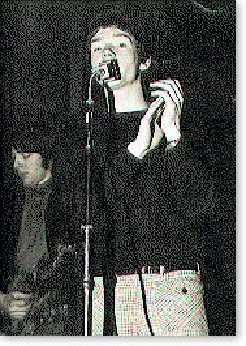 The reason we changed the tempo on
'Please Stay' was simply this: in
rehearsal I had learned the chords from the Zoot
Money version of the song, then Charlie sang the
words from a piece of paper, consequently we played slowly
so that everyone could pick it up. We liked the sound when
played at a slow tempo, and decided to keep it that way;
it was very moving the way Charlie Crane
sang it. The reason we changed the tempo on
'Please Stay' was simply this: in
rehearsal I had learned the chords from the Zoot
Money version of the song, then Charlie sang the
words from a piece of paper, consequently we played slowly
so that everyone could pick it up. We liked the sound when
played at a slow tempo, and decided to keep it that way;
it was very moving the way Charlie Crane
sang it.
The main problem with Joe Meek, in
my opinion, and at that time, was his inability to recognize
other people's views. He realised too late that groups could
write their own songs and put useful ideas into the production.
Had he taken the Beatles on in the beginning, we probably would
never have heard all those great songs. Everyone had to do
things his way and record songs written by him or
Goddard.
A few weeks after
the completion of the recording, John
Bennett left the group and Richie
Routledge joined. Richie had been with
the Aztecs. Richie played or song on all
subsequent records.
The album we recorded was not
released because 'Please Stay' never achieved
a high chart position. This was my understanding at the time,
but I do have some of the tracks we recorded on tape in my
possession. Time has not been good to them.
Some of the other tracks are in
the infamous 'tea chest tapes'. These are the tapes sold off
after Joe Meek's death, and are being kept somewhere in London,
allegedly in a tea chest and left to rot, and they are the
subject of lengthy fighting between John Repsch (Meek's
biographer) and the present owner of the tapes.
It was a great disappointment when
'Please Stay' did not make us rich, but I think it was more
complex than just short supplies. As regards Brian
Epstein, Eppy controlled the whole business then and
one doesn't tell the most powerful man in the biz to 'F***
Off!
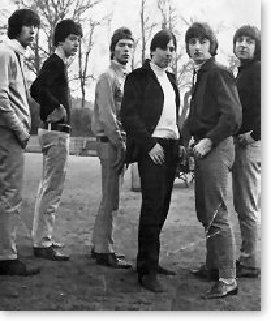 I don't believe they were the only reasons for
our early demise; we were not as talented as some of the
bands who had gone before. I don't think any of the second
generation bands matched those earlier bands, nor did we
have the experience of the Beatles, Searchers, Remo etc.
Hamburg gave them something the later groups
lacked. I don't believe they were the only reasons for
our early demise; we were not as talented as some of the
bands who had gone before. I don't think any of the second
generation bands matched those earlier bands, nor did we
have the experience of the Beatles, Searchers, Remo etc.
Hamburg gave them something the later groups
lacked.
The many and various band members
quoted in numerous places are incorrect. When the
Cryin' Shames broke up, various people tried to
exploit the name and cash in on the limited success that we had
enjoyed and worked hard for.
One person quoted as a member, who
wasn't, was Brian Norris. He was the bass player with Earl
Preston's Realms. Norris, along with Chris Findlay, Espie,
Byrne and Commerford backed Charlie Crane who illegally used
the name Cryin' Shames and was forced to change it to Paul and
Richie and the Cryin' Shames. A different group
altogether.
The only other people who spent
legitimate time with the Bumblies were Barry
Davidson on harmonica, Jimmy Marr on drums, Dougie (?) on
guitar, John Tague on vocals - and they were with us for only a
short time.
The real and only Cryin'
Shames were the seven members I have mentioned
previously.
There were people on Merseyside
who envied and begrudged us the small success we had, but were
only too glad to jump in and try to capitalize on the name when
it was all over, and 'ought to hang their heads in shame' (a
quote from Charlie Crane's letter to the Liverpool
Echo).
Charlie left the whole 'Shames'
thing behind after a few weeks and joined Gary Leeds and Joey
Molland as the group Rain. Molland then joined Pete Ham and
formed Badfinger.
I have seen a website which claims
that the Cryin'Shames name was changed to Paul & Richie and
the Cryin' Shames to avoid confusion with an American group of
the same name. This isn't true.
Katie and I have played in Spain.
While we were there we met a Liverpool singer who claimed to
have sung 'Please Stay' on the record. We have worked in the
Scilly Isles where I spoke to a man from Three Butt Lane. He
told me he was the bass player on the recording and described
it to me in detail, not knowing who I was. That incident would
make a story on its own.
I know there is a singer
performing in the Liverpool clubs at present who claims he sang
on the record.
The deaths index on the Merseycats
website cites an ex-Cryin' Shame I have never heard of,
alongside the names of Charlie and Joey. If all these people
were present, Joe Meek's tiny recording studio must have been
like the black hole of Calcutta that day!
Katie and I use the
name the Cryin' Shames Duo because it is
legally mine. The copyright of 'Please Stay' belongs to
me and the other surviving members. Graham Cole, a
solicitor from Weymouth pursued the legal problems
created by Joe Meek's suicide on behalf of all Meek's
groups. It took twenty-five years to get a settlement and
still no money has ever been forthcoming. This was the
same for the Tornados, Outlaws,
Lord Sutch, John Leyton and many
others.
I wrote the B-side of 'Please
Stay' - 'What's News Pussycat'. That is
definitely mine, although I am now forced to share composer
rights with Bob Dylan (I ripped off the tune
of 'On the Road Again'). I don't mind that! Apparently it is
still getting plays on American TV stations, calling it
'Freakbeat' - other Cryin' Shames B-sides also
share that distinction.
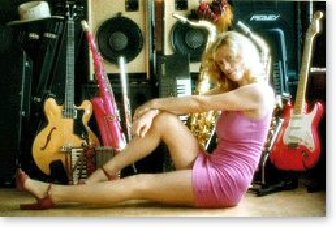 As a duo Katie and I play 1950s hits and rock
'n' roll (the music that influenced the Beatles). Katie
studied music at Glasgow University and can play almost
any instrument. Her specialty is saxophone and she plays
keyboards a la Jerry Lee Lewis. For someone so young her
favourites, surprisingly, are Johnny & the
Hurricanes, Duane Eddy and, of course,
the Beatles. As a duo Katie and I play 1950s hits and rock
'n' roll (the music that influenced the Beatles). Katie
studied music at Glasgow University and can play almost
any instrument. Her specialty is saxophone and she plays
keyboards a la Jerry Lee Lewis. For someone so young her
favourites, surprisingly, are Johnny & the
Hurricanes, Duane Eddy and, of course,
the Beatles.
We have played all over the world
but we recently moved to Wales and are nowadays happy to stay
closer to home.
We did try working in Liverpool
but the clubs seem to be all Bingo and Karaoke. Where did all
the 60s people go? (They all go to
MerseyCats. Editor)
We still do a supporting act at
various venues around the country for some of the 60s bands,
including the Searchers, the
Merseybeats etc and it's nice to speak to them
all.
I am doing what I always wanted to
do from the very beginning. I play Duane Eddy, Chuck
Berry, Fats and Jerry Lee etc. We drive a pink
1959 Cadillac - it's the 50s every day! Perhaps the
Beatles will come again!
We have constructed a web site for
Johnny & the Hurricanes, the only site on the web they have
approved and not forcibly removed. We plan to create other
sites for artistes of the era, with their approval.
Another bonus is that a number of
people think the Bumblies were the group that
recorded 'Nutrocker'. We don't argue and we feature the tune in
our act, but I've never actually said it was us! People will
expect Tchaikovsky, now I'm from the City of
Culture.
Luckily, Katie can turn to
Classical Music whenever the mood takes her, and run through
the odd bit of Beethoven.
It must be obvious how I feel
about events surrounding the Cryin' Shames.
All of the surviving members feel the same. Charlie
Gallagher says he has never seen his name anywhere on
the web, or in any of the books relating to the 60s Mersey
Sound. Even the record sleeve of the Joe Meek
album, which shows pictures of all the featured artistes, has
mistakenly inserted a picture of some other group.
A television show was planning to
screen a documentary about growing up in Liverpool during the
50s; one of the contributors to the programme explained in
detail how he formed the Cryin' Shames after leaving school.
When I wrote to the producer, explaining that this man was
never a member of the group, and I would make a fuss, the show
was scrapped.
Numerous CDs contain our
recordings, but we don't receive a penny. C'est la vie! But my
daughter is pleased to see me on vinyl - or is it
plastic!
Charlie Crane is
now dead, so too is Joey Kneen.
Richie, after spending time in Atlanta,
Georgia, now has a flourishing recording studio in the Wirral.
Phil and Charlie G, are both successful
businessmen. John B is in Australia having a
great life. I continue to play as the Cryin' Shames
Duo with my partner Katie. I am
entitled as I was the founder member of first the
Bumblies and ultimately the Cryin'
Shames
As a footnote,
the Cryin' Shames were the last group to
top the bill at the original Cavern
Club.
George
Robinson
|



 the church but it's at the junction of
Queens Drive and Muirhead Avenue. So there we were one
acoustic guitar, one Hofner Verithin a snare drum and the
biggest friggin Bass drum in the history of Rock music,
complete with the name of the band on the skin The
44th BB. John did'nt have a pedal so he just
booted the bass drum, unfortunately fashion at the time
dictated that we all wore "Winklepickers" so
after about 3 bars the toecap of his winkle appeared
through the skin in between the words Property of and 44th
BB!!. And that was the end of the practice, as we all
legged it before the Vicar found out.
the church but it's at the junction of
Queens Drive and Muirhead Avenue. So there we were one
acoustic guitar, one Hofner Verithin a snare drum and the
biggest friggin Bass drum in the history of Rock music,
complete with the name of the band on the skin The
44th BB. John did'nt have a pedal so he just
booted the bass drum, unfortunately fashion at the time
dictated that we all wore "Winklepickers" so
after about 3 bars the toecap of his winkle appeared
through the skin in between the words Property of and 44th
BB!!. And that was the end of the practice, as we all
legged it before the Vicar found out.

 I joined the Casbah in 1959.
It was over the road from where I lived. Like many others,
I paid sixpence to go and see the skiffle group. I had no
idea until later that it was the Beatles.
I joined the Casbah in 1959.
It was over the road from where I lived. Like many others,
I paid sixpence to go and see the skiffle group. I had no
idea until later that it was the Beatles. During 1963 I formed a group of my own.
John Bennet played guitar, he was a
friend of Gus, the guitarist with Karl
Terry. John had learned a lot from Gus. John was
a marvellous guitar player for the time.
During 1963 I formed a group of my own.
John Bennet played guitar, he was a
friend of Gus, the guitarist with Karl
Terry. John had learned a lot from Gus. John was
a marvellous guitar player for the time. I believe we were one of the best on Merseyside
at that time, we had a huge following, despite the fact
that Bob Wooler kept us out of the
Cavern.
I believe we were one of the best on Merseyside
at that time, we had a huge following, despite the fact
that Bob Wooler kept us out of the
Cavern. When 'Please Stay' was
released, it sailed into the charts. Brian
Epstein invited us to the Adelphi Hotel and made
us an offer of management, but due to disagreements
concerning Brian Harvey of Music Echo who had designs on
managing us, we turned this offer down.
When 'Please Stay' was
released, it sailed into the charts. Brian
Epstein invited us to the Adelphi Hotel and made
us an offer of management, but due to disagreements
concerning Brian Harvey of Music Echo who had designs on
managing us, we turned this offer down. The reason we changed the tempo on
'Please Stay' was simply this: in
rehearsal I had learned the chords from the Zoot
Money version of the song, then Charlie sang the
words from a piece of paper, consequently we played slowly
so that everyone could pick it up. We liked the sound when
played at a slow tempo, and decided to keep it that way;
it was very moving the way Charlie Crane
sang it.
The reason we changed the tempo on
'Please Stay' was simply this: in
rehearsal I had learned the chords from the Zoot
Money version of the song, then Charlie sang the
words from a piece of paper, consequently we played slowly
so that everyone could pick it up. We liked the sound when
played at a slow tempo, and decided to keep it that way;
it was very moving the way Charlie Crane
sang it. I don't believe they were the only reasons for
our early demise; we were not as talented as some of the
bands who had gone before. I don't think any of the second
generation bands matched those earlier bands, nor did we
have the experience of the Beatles, Searchers, Remo etc.
Hamburg gave them something the later groups
lacked.
I don't believe they were the only reasons for
our early demise; we were not as talented as some of the
bands who had gone before. I don't think any of the second
generation bands matched those earlier bands, nor did we
have the experience of the Beatles, Searchers, Remo etc.
Hamburg gave them something the later groups
lacked. As a duo Katie and I play 1950s hits and rock
'n' roll (the music that influenced the Beatles). Katie
studied music at Glasgow University and can play almost
any instrument. Her specialty is saxophone and she plays
keyboards a la Jerry Lee Lewis. For someone so young her
favourites, surprisingly, are Johnny & the
Hurricanes, Duane Eddy and, of course,
the Beatles.
As a duo Katie and I play 1950s hits and rock
'n' roll (the music that influenced the Beatles). Katie
studied music at Glasgow University and can play almost
any instrument. Her specialty is saxophone and she plays
keyboards a la Jerry Lee Lewis. For someone so young her
favourites, surprisingly, are Johnny & the
Hurricanes, Duane Eddy and, of course,
the Beatles.

